Vietnamese Turmeric Fish with Dill and Noodles (Cha Ca La Vong)
Vietnamese turmeric fish with noodles (Cha Ca La Vong) is a delicious and iconic dish of Hanoi. Chunks of flavorful fish are plated on a bed of aromatic green scallions and dill, boasting a unique dining experience.
Overview of Vietnamese turmeric fish with noodles (Cha Ca La Vong)
An iconic dish of Hanoi
Besides pho noodle soup, Cha Ca La Vong and Bun Thang are two other iconic dishes that represent the elegance and complexity of Hanoi cuisine.
The official name of this dish is Cha Ca or Cha Ca Hanoi. It features grilled fish that has been marinated with turmeric, tossed with sautéed scallions and dills, and served with vermicelli noodles, roasted peanuts and dipping sauce.
Visually, the dish looks stunning with beautiful golden fish and green herbs. In terms of taste, it has a perfect combination of sweet, savory, sour and umami.
Turmeric gives the fish not only a bright yellow color but also a mild earthy flavor. A variety of textures from the ingredients also makes eating Cha Ca fun and exciting.
If you visit Hanoi, there is no doubt that Cha Ca La Vong is a must-not-miss dish. There are a number of restaurants specialized in serving this dish. The most famous one also has the name of Cha Ca La Vong, and some other popular ones are Cha Ca Thang Long and Cha Ca Anh Vu.
Since it’s a Northern Vietnamese dish, it’s not easy to find a restaurant serving this dish in the U.S. I remember that several Vietnamese restaurants in London have Cha Ca on their menu.
Anyway, don’t worry because you can make it in your kitchen. We’ll get to how to cook it soon :).
A unique dining experience
Traditionally, Cha Ca is finished at the dining table. The restaurants would bring out grilled fish, fresh scallions, dills, noodles, peanuts and dipping sauce.
Diners would be provided a portable gas stove and a skillet in which they would fry/sauté scallions and dills and then add grilled fish, mix and finish cooking.
After that, each person would put some vermicelli noodles in their bowl and top with cooked scallions, dills and fish which are still hot right off the skillet.
How to cook Vietnamese turmeric fish with noodles (Cha Ca La Vong)
The main ingredients for this dish are fish, scallions, dills, turmeric marinade, vermicelli noodles, roasted peanuts and dipping sauce.
Fish
To make Vietnamese turmeric fish, you should use fillets of fairly firm white fish. Over the years, we have tried making it with cod, halibut, catfish, grouper, and monkfish.
They are all great choices, but the best one is monkfish thanks to its texture. The texture is somewhat like lobster with the right amount of softness. The one I like the least is cod because it’s a bit too delicate when fully cooked.
Marinade
My marinade consists of turmeric powder, shallot, garlic, galangal, fish sauce and shrimp paste.
In Vietnam, one more ingredient included in the marinade is mẻ (fermented rice) which is slightly sour. It’s hard to find this ingredient in the U.S. In her Into the Vietnamese Kitchen cookbook, Andrea Nguyen suggests using sour cream and Luke Nguyen uses yogurt in his The Food of Vietnam
cookbook.
Honestly, I think it’s okay to omit this ingredient because the dipping sauce will provide the sourness to the dish. If you want, you can add 1-2 tablespoons of sour cream or yogurt to the marinade for an even more authentic taste :).
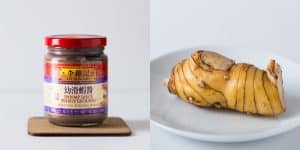
You can find galangal and shrimp paste at Asian grocery stores. When shopping for shrimp paste, you should look for the one with the Vietnamese translation as “mam tom“. It can also be labeled as shrimp sauce.
Shrimp paste has a strong pungent smell, so if you have never used it before, hold your breath before opening the jar. It adds a lot of umami to the dish though, so don’t be afraid to give it a try.
If you decide shrimp paste is not for you, just substitute with fish sauce. If you are unable to find galangal, increase the amount of shallot and add a small amount of ginger.
Dipping sauce
Restaurants in Vietnam usually serve two types of dipping sauce for Cha Ca La Vong. The first one is just the basic sauce from fish sauce, lime juice, and sugar.
The second one is a diluted shrimp paste dipping sauce. I admit that I never dare to try the second sauce because it’s really strong and pungent… I apologize for being unable to provide a recipe for a diluted shrimp paste dipping sauce…
Cooking method
It’s easy to cook Vietnamese turmeric fish at home. You just need to marinate the fish and then pan-sear or broil it in the oven.
After that, cook the herbs and throw in the fish, mix and all done. Restaurants usually use a lot of oil in this dish, but I cut it down to make it healthier.
If you have a portable burner, you can try serving it at the table in the same way as at Vietnamese restaurants. If that isn’t an option, just serve the cooked fish and herbs on a plate.
I used to serve it in the same way as at restaurants, but ever since I bought a Lodge cast iron fajita plate, I just heat the plate and transfer the cooked fish and herbs there and serve.
Another vermicelli noodle recipes that are served with no broth like this one are this Vietnamese Beef Noodle Salad (Bun Bo Xao) and Vietnamese Grilled Pork Meatballs with Noodles (Bun Cha). All three noodle dishes are very popular in Hanoi.
I’d love to hear what you think about the dish, so please feel free to leave a comment. You can find my collection of Vietnamese recipes here. New recipes are added every week so let’s connect on Facebook, Pinterest and Instagram for the latest updates.
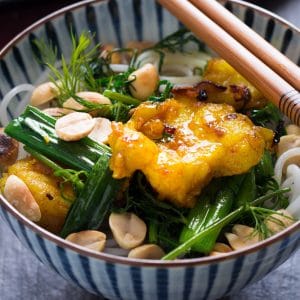
Vietnamese Turmeric Fish with Noodles (Cha Ca La Vong)
Ingredients
For the fish
- 1 lb fish fillet (see recipe notes below for recommendation)
- 1 2-inch long galangal
- 1 tablespoon minced garlic
- 2 tablespoons minced shallot
- 3/4 teaspoon turmeric powder
- 1/2 tablespoon shrimp paste
- 1 teaspoon fish sauce
- 3 tablespoons oil
For the dipping sauce
- 4 tablespoons lime juice
- 4 tablespoons water
- 1 1/2 teaspoons fish sauce
- 1 1/2 teaspoons sugar
- 2 teaspoons minced garlic
Other ingredients
- 10-15 stalks of scallions
- 1.5 oz dills
- vermicelli noodles
- roasted peanuts (unsalted)
- more cooking oil
Instructions
- Slice fish into 1/2 – 3/4-inch thick pieces. You may need to slice on an angle to have wide pieces.
- Peel galangal, slice and finely chop. If possible, use a pestle and mortal to crush into finer pieces (about 3 tablespoons).
- In a mixing bowl, add fish and all ingredients in the first group and mix well. Refrigerate and marinate for at least 30 minutes or more for a tastier result.
- Cut scallions into 2-inch long pieces, keep the white and green parts separated. Also cut dills into 2-inch long pieces.
- Whisk together all ingredients for the dipping sauce, taste and adjust to your liking.
- Prepare vermicelli noodles according to package instructions.
- After fish has been marinated, remove from the refrigerator. Place a pan over medium high heat, add cooking oil, put fish in a single layer and sear and both sides to cook. You may need to sear in several batches. Another option is to broil fish on high for 8-10 minutes. Transfer to a clean plate.
- Wipe the pan clean, place over medium – medium high heat. Add oil and then add the white part of scallions. Sauté for about a minute until color starts to develop, then add the green part. Sauté for 20-30 seconds and then add dill. Give everything a quick mix to combine and wilt the dill.
- Add fish slices to the pan, stir to mix with scallions and dills. Be careful to not break the fish slices.
- Transfer everything to a preheated cast iron fajita plate or a regular plate and serve immediately with noodles, roasted peanuts and dipping sauce.
Notes
- You should use fillets of fairly firm white fish. Over the years, we have tried making it with cod, halibut, catfish, grouper, and monkfish. They are all great choices, but the best one is monkfish. Cod can be delicate when cooked.
- If you have a portable burner, you can try serving it at the table in the same way as at Vietnamese restaurants. After step 7, at your dining table, turn on the portable burner, place a skillet over it. When the skillet is hot, continue with step 8 and 9.
- If you don’t like shrimp paste, just substitute with fish sauce. If you are unable to find galangal, increase the amount of shallot and add a small amount of ginger.

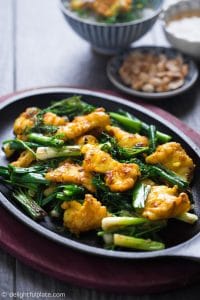

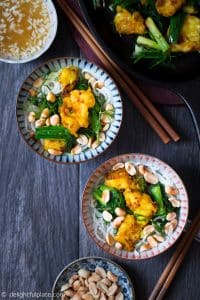
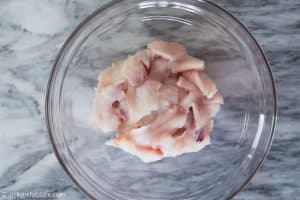
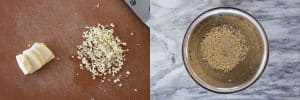
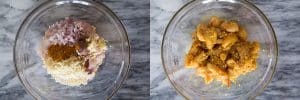
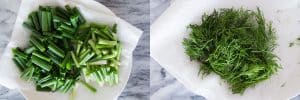
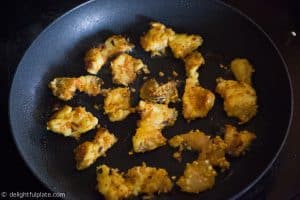
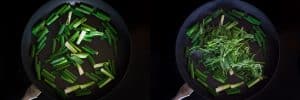
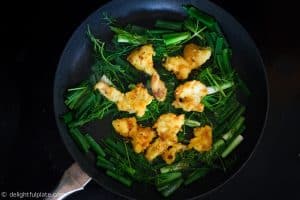

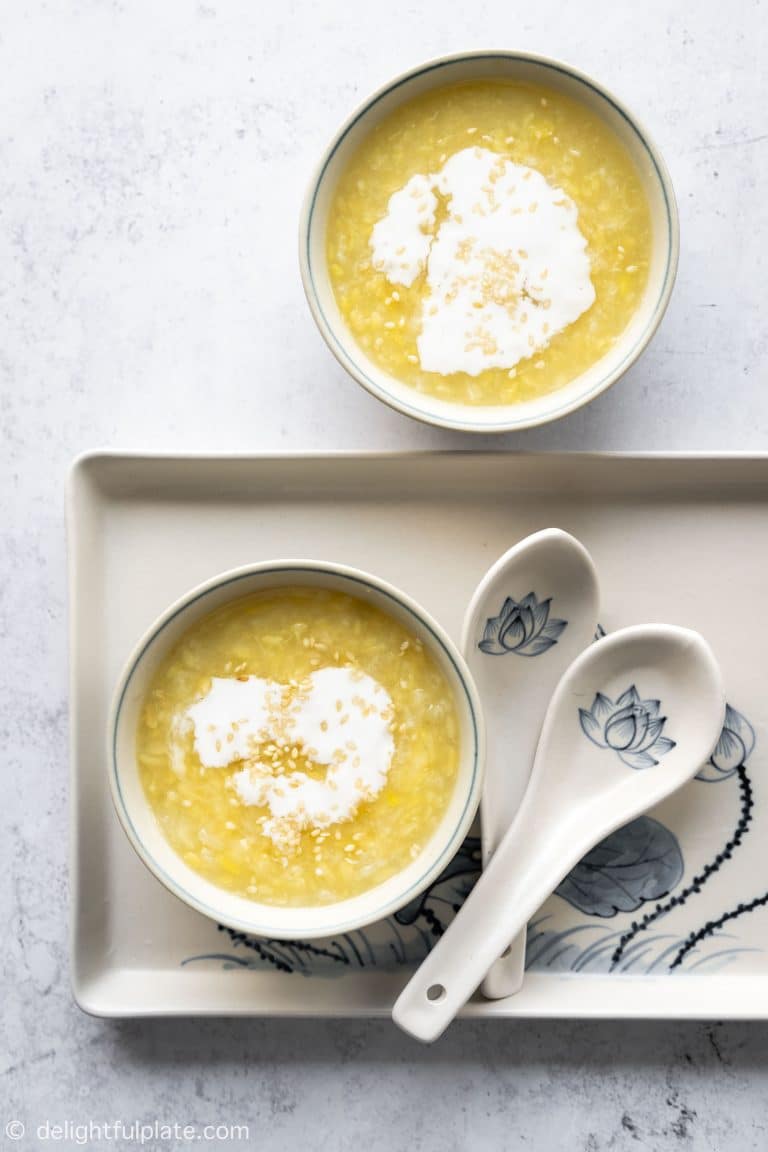
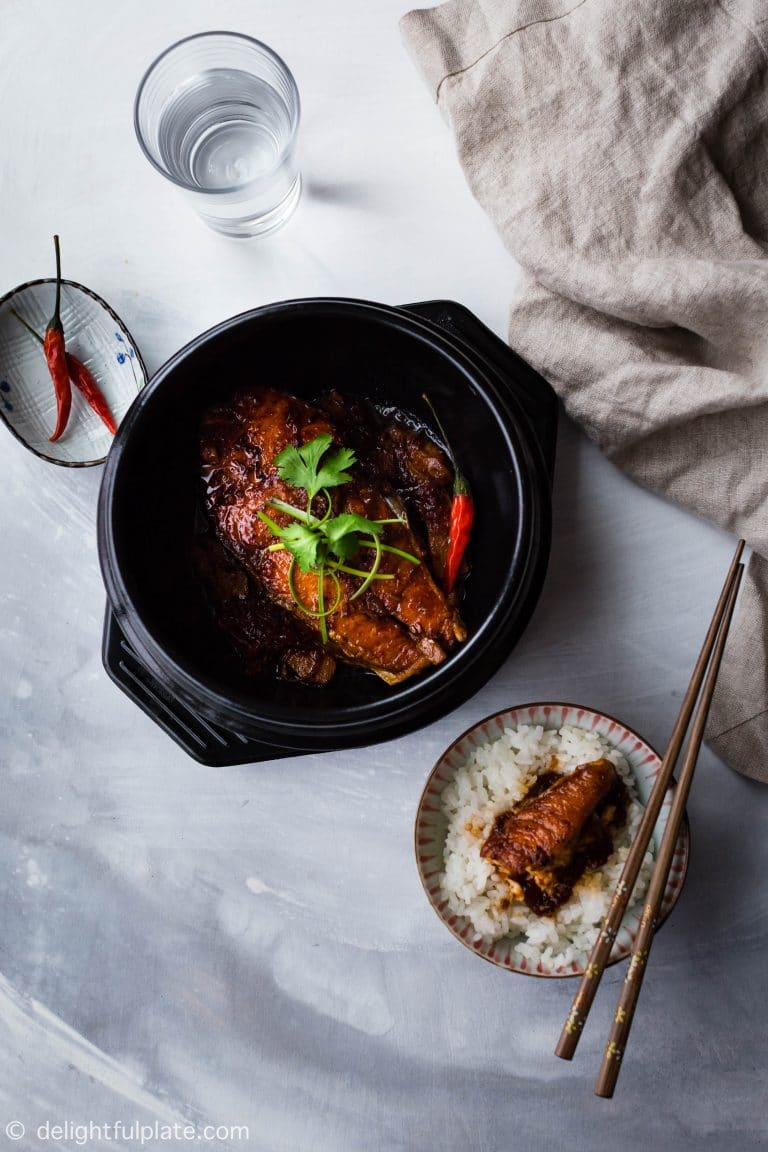
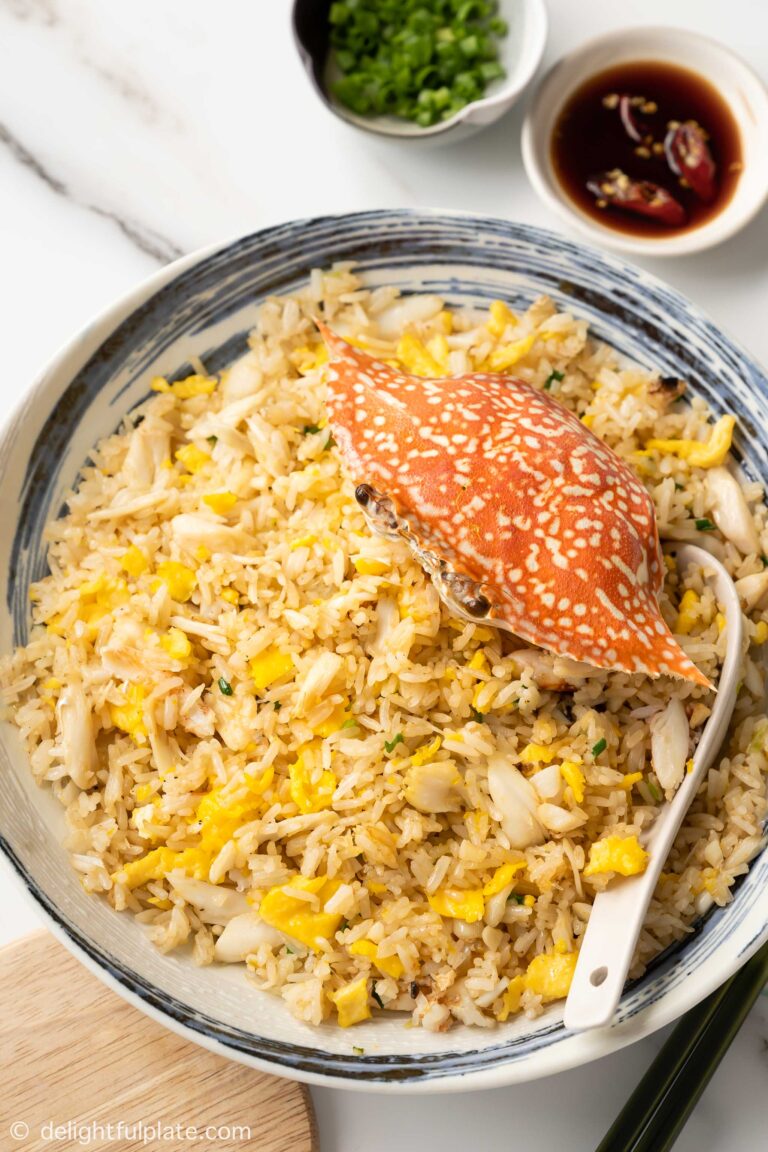



Definitely will try to make it.
Thanks
Beautiful
This. Was. Delicious!!! Pretty easy and so many flavors!!! The dipping sauce was also really good, but we found we didn’t really need it because it was so flavorful already. This dish really had everything: taste, texture, and it looked tasty-healthy too!
Thank you for the feedback! I’m glad it turned out so flavorful that you didn’t need to add the dipping sauce.
The fish marinade is spot on. Thank you for this authentic recipe. Definitely will make it again.
just wanted to say that this was so delicious that eating it made me all emotional! i also added lots of lime zest into the sauce, and i had some rau răm, ngò gai, and bits and pieces of a couple other Vietnamese herbs in my fridge, so i added them in too. thank you for the recipe, will definitely be making this one again!
Hi Lee,
Thank you so much for the feedback! I’m glad to hear how much you enjoyed it. This dish also brings back some fond memories to me. It’s good to know it tastes good with other Vietnamese herbs too.
Thank you for the recipe & overview on the dish for newcomers. I’ve made this a few times in the past and I’m glad I checked out your recipe because I almost forgot the green onions. I used catfish because I love the taste & texture of catfish and it’s easy to access. It is pretty fragile when cooking so I avoid flipping it too often. This recipe was just enough for two people for dinner. I think I will use 2 lbs of fish next time for two people so that I can have some more left over for the next day. I have the Cheng Kee Kee brand of fish paste. I only used 1/8 of a teaspoon. 1/2 TBS seemed like a lot. I used two huge bunches of dill and it really cooks down so feel free to use as much as you want. I didn’t make the dipping sauce because I was lazy – it’s such a flavorful dish that it’ll be okay if you don’t have time. Be careful of cooking it too long because it gets saltier and saltier even if you leave it on low heat on the stove to stay warm. This is my first time trying a recipe from this website, I will be back to try some more. The layout and the photos are very pretty. Thank you for mentioning specific restaurants in Vietnam. I’ve bookmarked them on my maps app.
Hi Andrea,
I’m so sorry I missed you comment. Thank you for sharing how you made the dish at home and many useful tips. If you are not a fan of shrimp paste, it is surely fine to cut down on it. I think a lot of fish can be used to make this dish as long as it’s not too firm or dense.
I’m glad you found the layout and photos pretty. We constantly look for ways to make improvements to the site for better browsing experience.
Can you use Malaysian belacan (fermented shrimp block) instead of this shrimp paste in a jar? If so how much?
Hi Jo,
I haven’t used belacan but I heard it is stronger than Vietnamese shrimp paste. I guess you can try with a very small amount, probably start with just 1/3 or 1/4 of the amount of shrimp paste stated in the recipe to see how that goes. I have made this dish without shrimp paste before and used a bit more fish sauce to compensate for that. It turned out quite okay too. I hope this helps!
I had this in Hanoi about a year ago and my wife and I fell in love with it. Here in the Philippines I use frozen bangus (milkfish) and, as available, fresh turmeric root if I can find it (not difficult but not always available). Your recipe is fairly spot on in my humble opinion, though it’s not uncommon with cha ca to also serve most any other greens; sliced cucumber, lettuce or pechay and on occasion, thinly slivered bits of carrot.
Hi Chris,
Thank you for the comment and I’m glad that you and your wife tried this dish in Hanoi and loved it. It is also a dish people from Hanoi like us are proud of.
At some traditional cha ca eateries where we used to visit, cha ca can also come with some additional herbs on the side besides the ingredients mentioned in the post. However, it actually surprises us to know that some places serve it with lettuce, cucumber and carrots. Maybe that’s additional accompaniments at newer places?
This looks fantastic! Though I‘ve never been to Vietnam, I love the earthiness of turmeric and the brightness of the veggies. Can‘t wait to try.
Hi Debgrayson,
Thank you for your comment! If you love turmeric, I think you will like this dish. Please feel free to let me know what you think if you try it :).
Sophie